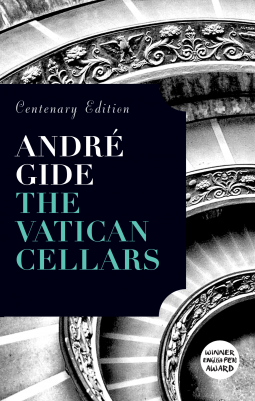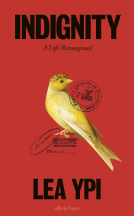
The Vatican Cellars
by André Gide
This title was previously available on NetGalley and is now archived.
Send NetGalley books directly to your Kindle or Kindle app
1
To read on a Kindle or Kindle app, please add kindle@netgalley.com as an approved email address to receive files in your Amazon account. Click here for step-by-step instructions.
2
Also find your Kindle email address within your Amazon account, and enter it here.
Pub Date 11 Aug 2014 | Archive Date 10 Sep 2015
Description
Available Editions
| EDITION | Other Format |
| ISBN | 9781908313690 |
| PRICE | £9.99 (GBP) |
Average rating from 12 members
Featured Reviews
 Annie S, Librarian
Annie S, Librarian
Why do we behave the way that we do? Psychologists would argue about nature versus nurture, but they rarely go so far as to talk about the ongoing pressures that family and society and law and religion and culture have on us as adults. André Gide’s The Vatican Cellars, originally published in 1914, is an exploration of that very question. The exploration, however, is the subtext to a strange and funny tale of atheists who find faith, pietists flirting with atheism, con men, nihilism, misguided love—and family.
I picked this book up because the description mentioned a pope being kidnapped and farce. I don’t think I read anything else about The Vatican Cellars on the NetGalley cite before I hit the request button. A casual reader wouldn’t expect anything like this from the first chapters of this brief book. According to the note at the end of the book, Gide didn’t consider The Vatican Cellars a novel. He called it a sotie:
A sotie (or sottie) is a short satirical play common in 15th- and 16th-century in France. The word (compare modern sottise) comes from the sots, “fools”, who appeared as characters in the play. (Wikipedia)
In those first chapters, we are introduced to Anthime and his wife, Véronique, his brother-in-law and sister-in-law. Anthime is a staunch, combative atheist. He drives his wife crazy with his cruel experiments on animals and his constant antagonism towards the rest of the family’s faith. One night, after damaging a statue of the Virgin Mary, Anthime has a vision and wakes up cured of the pain in his leg. Anthime immediately converts, becoming so saint-like that it annoys his family even more than his atheism. After these chapters, Gide detours into the tale of the brother-in-law, Julius de Baraglioul, and Julius’ previously unknown illegitimate half-brother, Lafcladio Wluiki. While Julius is very proper and highly conscientious of his family’s reputation, Lafcadio is almost the prototypical nihilist.
As we learn more of Lafcadio’s debauched youth and his lack of empathy to pretty much everyone in his life, the story shifts again to yet another member of Julius’ tangled family. Julius sister, a comtesse, is taken in by a scam artist. The note at the end of the book reports an actual scam that occurred in 1892 that inspired Gide. Con men would dress as priests and target credulous and deeply devout rich people by asking for money to free the pope, who they said had been kidnapped. If word got out, the con men said, Catholicism would collapse. One of Lafcadio’s childhood friends, Protos, is deeply involved in running the con. There are coincidences everywhere in The Vatican Cellars. They are used to great effect to gaslight some of the characters into believing that there really is a vast conspiracy involving the pope.
I get the impression that The Vatican Cellars would make more sense to someone reading in 1914. The antagonisms hinted at between the Catholic Church and the Freemasons. Lafcadio’s character would probably make more sense before the creation of existentialism, when nihilism and the will to power and traditional values did battle for people’s souls. Still, Gide’s subtle, snarky humor had me very entertained, even though many of the characters do completely depraved things. I understand why Gide was such a controversial author in his time.
I received a free copy of this ebook from NetGalley, in exchange for an honest review.
 Educator 211653
Educator 211653
Thank you Net Galley. This is a well plotted story of coincidence and errors. The author has also raised questions re what are faith and piety. He questions the motivations of the religious and the politicization of religion. All as pertinent today as in his times.
 Douglas O, Reviewer
Douglas O, Reviewer
Smoothly written and sensitively translated, this story had me smiling throughout. The lead character is very well drawn as are the others. They take themselves too seriously with too much introspection and that is where the humour is subtle. It all ends, of course, in the kind of shambles they all live in and that satisfies the reader too.
 AliceMaud M, Reviewer
AliceMaud M, Reviewer
Inspired by a true scam in the C19, this novel may be read as a comic romp or as something more thought-provoking. Without passing judgement, the author observes and contrasts characters who live outside any moral code, those who constrain themselves within a strict moral and religious ethic, and those who live a life of ill-intent. The loose connections between the strands of the plot are not unusual these days, but must have been a challenge to readers when the book was published.
 Meghan Rose A, Reviewer
Meghan Rose A, Reviewer
Start the month with a hundred year old Austrian satire, end the month with a hundred year old French satire. Why not?
Not that I was really aware this was a satire before the opening page (The Vatican Cellars: An allegorical satire) told me. I ARC'd The Vatican Cellars because I read La Symphonie pastorle in high school, which is a story pretty much perpendicular to this one. I don't recall La Symphonie pastorle as a romp. The Vatican Cellars is a romp. The satire here is definitely more subtle than in this month's earlier Austrian satire (i.e. no Martians sweeping in at the end and blowing up the earth). I appreciated that, having the author think me a little bit clever. But I likely missed a lot of the Catholic jokes and I know I missed pretty much all the Freemason ones.
So we have our romp. There's a whole intermingled family (three sisters, their husbands, an illegitimate child, the childhood friend of the illegitimate child, the girlfriend of the illegitimate child and his childhood friend (generally not at the same time, but maybe?), the sister of one of the husbands, the father of same husband, a childhood friend of another husband (who is in love with the sister his childhood friend married), a bunch of the kids of various sisters and husbands); part way through I felt like I needed one of those family trees found in the front of heavy Russian novels. Then I sorted myself out and continued. The main narrative thrust, at least the one that gets most of the family from France to Italy, is a sort of 419/Nigerian-Prince scam, where you roll your eyes at the characters who can't seem to see how ridiculous the whole thing is, en courant comme des canards sans tête. There's the proto-nihilism and a crime that one could attribute, retroactively, to Mersault. There's a bunch of pious characters ignoring taboos (extra-marital affairs! incest! blasphemy!). There's a dragging of the last twenty pages or so as some of the machinations are revealed to some of the characters and then ...
And then the story simply stops. Bam. Like a wall and we're in the endnotes and afterword.
Um, okay.
The afterward tries to suggest that the abruptness is again a manner of playing with preconceptions, i.e. where is the happy ending, or the comeuppance or the return to moral rectitude? Nowhere! Because I, André Gide, am trying to fuck with your idea of how stories like this should end. Ha ha ha ha ha ha ha ha!
Ha?
So the book was funny and engaging and then it started to slog and then it finished. The End.
But I will mention that The Vatican Cellars is not at all like La Symphonie pastorle, which is more what I was expecting because I never read the blurbs on Netgalley maybe as closely as I should have?
See the kind of wacky verb-tenses in that past sentence? There's a lot of verb-tense changes The Vatican Cellars. I suppose they are from the original text and not the translation, but they pull me out of the story. Also the narrator who likes to talk to the reader now and then, I think to remind us that André Gide is somewhere watching us. Then the translation, which the introduction assures me has been modernized for today's reader, veers between describing something as looking gross (at least it wasn't gnarly) then using words like bumf, which is apparently British slang, no idea if that's contemporary or not. I'm glad my kobo has a dictionary for me to look these words up in. Ending a review like this, without any real sort of conclusion may seem a bit odd, but think of it this way, I am trying to fuck with your idea of how reviews like this should end. Ha ha ha ha ha ha ha!
Ha?
The Vatican Cellars, by André Gide, a new translation by Julian Evans, went on sale August 11, 2014.
I received a copy free from Netgalley in exchange for an honest review.










